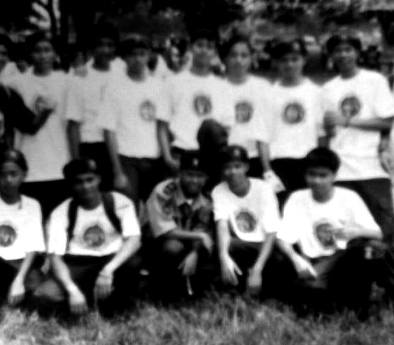I began blogging exactly five years ago. That night of 8 June 2008 when this blog debuted was like tonight; it was raining hard. Traffic of motorbikes scurrying to reach their destinations halted outside because the downpour was just too much to bear for the antiquated drainage system of that old district of Hanoi. The woman selling pho outside our compound was still there, seated in her red kiddie plastic chair serving bowls of steaming rice noodles submerged in that divine broth to stranded motorists who did not bother taking off their colorful raincoats and equally multi-colored helmets.
That night I was suffering from a level of boredom too extreme and painful it was one of those rare times I can recall I cried. I cried a lot. I missed home so badly. I felt invisible because I was indeed living invisibly. For the woman selling pho outside I was just “that” strange ngoui nuoc ngoai, for the rest I was a nonentity.
Writing down about those gamut of feelings I knew I would never fully capture in writing, I thought, would be the best way for me to at least have some semblance of order during those months when nothing seemed to make sense. (It’s not as if things make more sense now. (Often they still don’t make sense, though I never stopped attempting to understand them.) I was twenty-two then. I could feel I was poised to realize whatever it was I was dreaming of. I have completely convinced myself then that whatever inconvenience it was that I was going through in that foreign country was a way of gaining a foothold to something bigger. I didn’t know what that something was then, and I can never be less sure now.
I didn’t care that “Going Against the Current” was too corny a title. But it was the first thing that occurred to me. I subtitled it ‘thoughts of a twenty-something.’ I wasn’t aware then that I was having my share of quarter life crises. I didn’t know the term existed. But I knew there was something odd about that whole set-up. Living and studying in Vietnam was not part of my plan then. I only wanted to escape from the banality of my existence right after graduating from college that I was willing to be hurled anywhere, only to find myself hurled nastily in that blah. I was living by myself in that shoebox of a rented place on Tran Hung Dao Street in the old district of Hanoi, which only exacerbated what then was a terminal case of ennui. At that time, it was the aptest title I could think of for a personal blog.
I wrote this to console myself:
“On Being an Exile”
I have been reading a short essay written by Jorge Luis Borges, and he talked about how being an “exile” brings out parts of our personalities that is unknown to us, and will forever be unknown to us, unless we allow ourselves to be exiled or for us to be exiled by force (which can be in any form such as that of the state, an organization, or the bigger society).
Here, I shall be talking about throwing one’s self away, figuratively, that is, one chooses to embark on the feat of a self-exile. Consciously choosing to leave, and here it means physically deserting anything that has to do with a secure life, and living in a place that is foreign, a place where doing something for comfort will prove burdensome. Barriers will include inability to communicate one’s self, lack of cultural knowledge, ethnocentricity, etc.
Just like all ethnographic researches, the researcher, or as in our case the exiled, faces several stages of coming to terms with himself in relation to his environment and its actors. Roughly, there will be a period of much patronizing and romanticizing, that is, the exiled will think that everything around him is better than what he has left behind. It will be followed a realization that things around him are different and therefore will tax his understanding of all the cultural truths as well as subtleties in his new environment. This will awaken the hidden ethnocentric (and xenophobic) character of our subject which lead to a gap and further distancing from everything around him and creating a world of his own making. Although this may sound pessimistic, this is necessary for the subject to create a giant leap towards understanding and eventually living in harmony with the foreign people surrounding him.
The third period, which I will refer from hereon as ‘distancing’, is a very crucial step because this is where the hidden and repressed selves of our subject surface and thereby allowing different personae to make themselves known to him. Here, creativity, appreciation of one’s former society, and objective probing of the world in general are strengthened and are highlighted.
In distancing, the mind of the subject shifts from a passive, non-observer of events, objects, cultural truths and subtleties, and idiosyncracies into a more active, peering, and critical entity. Interestingly, this also leads to a blossoming of the artistic mind, scientific inquisitiveness, and more understanding of the inner self as well as the emotion. Distancing allows the exiled to have a hold of his world and shape it in a way that can be radical, sometimes, but most of the times more reformative, and in general beneficial. It can be in a form of literary works such as Thomas Mann’s Magic Mountain or Tolstoi’s novels War and Peace and Annakarenina, or Jose Rizal’s Noli Me Tangere and El Filibusterismo.
It is, therefore, necessary, especially for the young people, to travel and to detach themselves from the mundane and the usual and immerse themselves in a world devoid of comfort and security.
No amount of feigned cockiness could hide the insecurity of my twenty-two-year-old self, of my inability to know where exactly I was heading. Still I treaded on because doing the most difficult was the easiest thing to do. And I never regretted having gone on with the journey. The ride has been exciting and I look forward to more years of blogging. I just hope that when another five years is done, I’d be a lot better.
0.000000
0.000000




